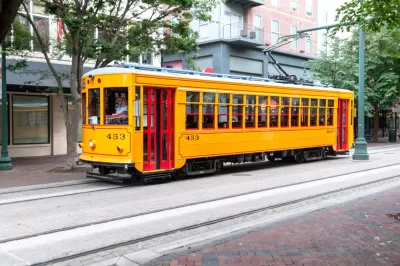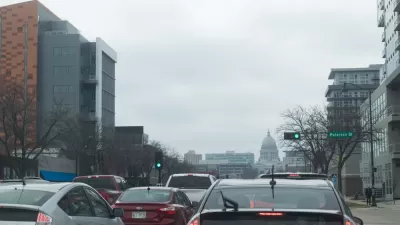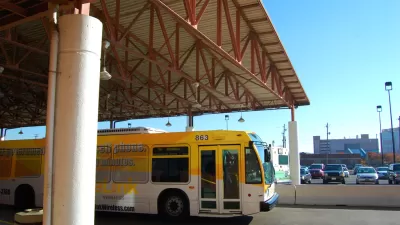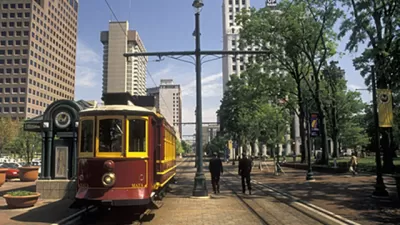Called a 'sustainability fee' by Mayor Lee Harris of Shelby County, the proposed fee would apply only to households that have three or more registered vehicles, about 17 percent of county residents. The first two vehicles would be exempt.

Mayor Lee Harris of Shelby County, the second most populous in Tennessee, may be on to something—a progressive user fee, of sorts, to benefit the Memphis Area Transit Authority (MATA). Unlike most local transportation measures in California and much of the United States, the latest being the Bay Area's mega measure proposed for the November 2020 ballot, Harris wants to tackle both sides of the transportation problem.
"You want to have your problem and solution match," Harris told Smart Cities Dive, reports Katie Pyzyk. Harris continues:
"The solution here is to get those who probably contribute to traffic congestion to contribute to the solution... The folks who are probably doing their fair share of getting around and creating emissions and traffic congestion, let's try to get them to help the folks who can't around at all right now."
As a user fee, the $145 annual sustainability fee bears similarity to ride-hailing fees, congestion pricing, particularly cordon pricing plans like the one in the works for Manhattan, and the 'car tab' included in the Seattle area's 2016 transit mega measure. By restricting the fee to the "third and additional" vehicles, the flat fee (unlike the car tab which is based on the vehicle's assessed value) becomes less regressive and adds to the equity that comes with using the revenue to improve transit.
"The proposal will have a big impact on transit," states the mayor's Sept. 4 news flash. "A dedicated investment of at least $10 million has an economic impact of more than $40 million as a result of expanded job access and reduced car crashes."
“This landmark plan will dramatically change the trajectory of funding for public transit in this community,” says Gary Rosenfeld, CEO of MATA.
Indeed, according to Harris' "Future for Transit" [pdf] proposal, it would be the third-largest source of revenue for MATA after contributions from Memphis and federal funding. It would mean that the $9 million from multi-car households would fund the transit system more than transit patrons do with their fares.
According to the mayor's office, the sustainability fee would positively impact the environment, the state's economy, and people's lives.
The investment would have a big impact on our shared environment. It would increase ridership by at least one million rides, therefore reducing emissions by thousands of metric tons.
This plan would have a big impact on poverty. There are 15,000 available jobs in Shelby County. More frequency helps people get a job and keep a job.
"The Shelby County Commission is expected to vote on the measure by late February, following a public hearing and comment period," adds Pyzyk.
"It's a pretty innovative approach... Obviously, there's going to be some negative reaction to an additional fee," [Harris] said. But he said the public likely will come around if they "hear more of the story, that it doesn't really apply to most people and it's a way to generate resources for something that can benefit the public at large without a general tax increase."
Related in Planetizen:
- A 'Memphis 3.0' Vision for Transit Taking Shape, October 4, 2017
-
Memphis Planning for a Big Expansion of Transit Service, August 31, 2017
FULL STORY: Shelby County, TN proposes vehicle ownership fee to fund transit

Study: Maui’s Plan to Convert Vacation Rentals to Long-Term Housing Could Cause Nearly $1 Billion Economic Loss
The plan would reduce visitor accommodation by 25,% resulting in 1,900 jobs lost.

North Texas Transit Leaders Tout Benefits of TOD for Growing Region
At a summit focused on transit-oriented development, policymakers discussed how North Texas’ expanded light rail system can serve as a tool for economic growth.

Using Old Oil and Gas Wells for Green Energy Storage
Penn State researchers have found that repurposing abandoned oil and gas wells for geothermal-assisted compressed-air energy storage can boost efficiency, reduce environmental risks, and support clean energy and job transitions.

Private Donations Propel Early Restoration of Palisades Playground
Los Angeles has secured over $1.3 million in private funding to restore the Pacific Palisades playground months ahead of schedule, creating a modern, accessible space that supports community healing after recent wildfires.

From Blight to Benefit: Early Results From California’s Equitable Cleanup Program
The Equitable Community Revitalization Grant (ECRG) program is reshaping brownfield redevelopment by prioritizing projects in low-income and environmental justice communities, emphasizing equity, transparency, and community benefits.

Planting Relief: Tackling Las Vegas Heat One Tree at a Time
Nevada Plants, a Las Vegas-based nonprofit, is combating the city’s extreme urban heat by giving away trees to residents in underserved neighborhoods, promoting shade, sustainability, and community health.
Urban Design for Planners 1: Software Tools
This six-course series explores essential urban design concepts using open source software and equips planners with the tools they need to participate fully in the urban design process.
Planning for Universal Design
Learn the tools for implementing Universal Design in planning regulations.
Ascent Environmental
Borough of Carlisle
Institute for Housing and Urban Development Studies (IHS)
City of Grandview
Harvard GSD Executive Education
Toledo-Lucas County Plan Commissions
Salt Lake City
NYU Wagner Graduate School of Public Service





























